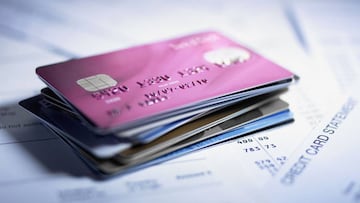Is it better to pay off your credit card debt immediately or slowly?
Despite what you may have heard, carrying a credit card debt is not in your best interest. But paying off what you owe is sometimes easier said than done.

Having a credit card can be useful for making purchases when you don’t have the cash on hand to shell out for certain expenses. However, the trend among Americans is to increasingly use their credit cards no matter what. 28 percent of all purchases in 2021 were made with credit cards, the highest amount recorded by the Federal Reserve Bank of San Francisco. The survey found that just 9 percent of Americans used cash to make their purchases.
Despite what you may have heard about using them to improve your credit score, carrying a credit card debt is not in your best interest. While credit cards are convenient to use and provide security when paying, if you have to carry a balance from one month to the next interest gets tacked on. Falling into a debt cycle can see the amount that you owe balloon, exceeding the amount that you originally spent with the credit card.
But paying off what you owe is sometimes easier said than done. Making sure to pay off the minimum amount is fundamental to keep your credit score from getting lowered. Late payments, not to mention a default, are the factor that weigh most heavily on your credit score.
You may be interested in: The 3 best ways to not lose your credit score
Is it better to pay off your credit card debt immediately or slowly?
The San Francisco Fed published its Economic Well-Being of US Households in 2022 report recently. Last year, around 82 percent of Americans had a credit card and of those it was split evenly between those who paid their balance in full each month and those who didn’t. The researchers found that of the bills that Americans did not expect to pay in full that month, the most common was their credit card at 9 percent of respondents. Nearly three-quarters were carrying a balance at the time of the survey.
In the first quarter of 2023, American households had a total of $986 billion in credit card balances according to the Federal Reserve Bank of New York. The national average works out to nearly $7,300 in unpaid balance per cardholder.
You may be interested in: Consumer debt payment: What are the snowball method and the avalanche method?
One reason why people sometimes don’t pay their balance in full, even if they can, is based on the myth that it will help improve their credit score. Even if you are making the minimum payment on time each month, it could still hurt your credit score. That’s because the second most important factor in your credit score is your credit utilization ratio, accounting for 30 percent of your FICO Score. This is the comparison between the balance you are carrying to your overall credit limit.
It’s commonly recommended that your credit utilization ratio should not exceed 30 percent. In order to show healthy credit and get a better credit score you will want to get your credit utilization ratio into the low single digits if not to zero.
To help your credit score, do not cancel your credit card once you’ve paid off the balance, as that will only serve to reduce your overall credit utilization ratio when you figure in other credit cards you may have. That said, you want to make sure that you aren’t holding onto too many credit cards. This could negatively impact your credit score if they make up too much of your credit mix according to Experian, one of the three big credit reporting agencies.






